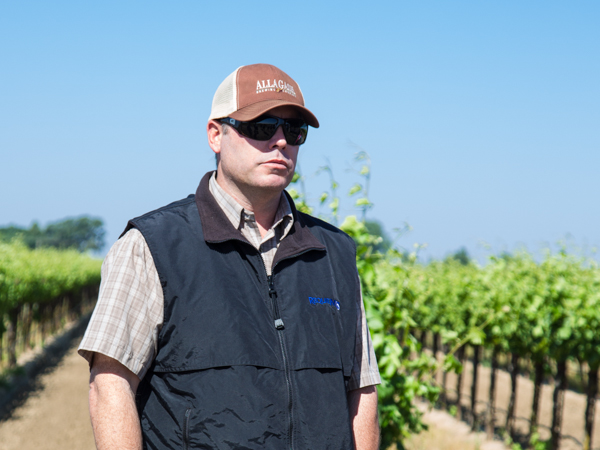
Kevin Phillips thinks organic is a complete scam - so why is he farming one of Lodi’s most renowned vineyards organically? Bechthold Vineyards is the oldest continuously-farmed vineyard in Lodi, originally planted in 1886. It’s only 25 acres, but the grapes are highly prized by clients like Randall Grahm of Bonny Doon, Abe Schoener of Scholium Project and Turley Wine Cellars.
Of the 800 acres of vineyards Phillips oversees for Michael-David Winery (founded by his father and uncle), Bechtold is the only one farmed organically. The rest are farmed under Lodi Rules - a sustainable program that Kevin prefers for both economic and environmental reasons.
What are your thoughts on organic grape growing?
I think organic is a complete scam. It’s a faulty premise to think something is specifically better just because you don’t use a synthetic product in the growth of the fruit.
Why are you farming Bechtold Vineyards organically then?
These producers [Bonny Doon, Scholium Project, Turley] prefer the organic method, so I do it for them because they’re putting Lodi on the map. The wines are in hipster restaurants in New York and Chicago. It puts Lodi in people’s consciousness. I don’t need to sell the grapes, we could use them for our own winery, but it’s my way of taking one for the team for the appellation as a whole.
What are the problems with organic farming?
Take pests. There’s certain materials I use in other vineyards that will target a specific species, but they won’t hurt anything else in terms of beneficial predators. If I have a pest in an organic vineyard I have to use something that wipes out everything. It creates a self-serving problem.
Spider mites are a big problem in Lodi, the most economically damaging pest in the area. When I spray the organic vineyard it whacks everything. And I may have to use three or four applications to stay on top of the population.
Right next door, with a vineyard under Lodi Rules, I can use Agrimek. I spray one time and it doesn’t hurt my beneficial predators in any way. It whacks the mite population and is extremely environmentally friendly. I can do it one time and not have to worry about it for the rest of the year. This is where you have to look at the big picture. With organic I ’m using five times more diesel to spray, with more dust and air pollution in the process.
How did you start farming under Lodi Rules?
Lodi has an active wine grape commission. The program was starting to take off and I really liked what it was doing. I wanted to be supportive of a regional program. We were the first winery that offered a bonus to grape growers who joined the program. It became very successful -- both with the quality of the grapes and the wine from the vineyards.
We started in 2007 with 55 percent voluntary compliance with our growers. Then we mandated it. By 2010 we had 100% compliance from all our Lodi growers. We still get around five percent of our grapes from outside the region though.
What are the benefits of Lodi Rules?
It forces you to a level of reporting of what your practices are that nobody traditionally does. There’s an environmental assessment done by a 3rd party. They do multiple tests and rank them and give them a factor. The program stresses flexibility; what makes sense in one place might not work in another. Take lime sulfur. It’s extremely damaging and bad for worker health. It’s an organic material, but you can’t use it under Lodi Rules.
Does it help the bottom line? Definitely. We’re using a lot less diesel fuel and that helps the environment. But the quality of grapes is the main factor, along with an awareness of doing things that has effects on multiple levels.
How much more expensive is it for you to farm organically?
About 20 percent. It costs more in labor and fuel, because you have to do more passes with everything. It’s a loss of efficiency more than anything.
What happens if you get more clients who love your organic grapes?
(laughs) I’d say “I’m good. I’m comfortable where I’m at.” I don’t need any more grape buyers. I could use all my grapes at my own winery. It’s a totally different decision for another grower.